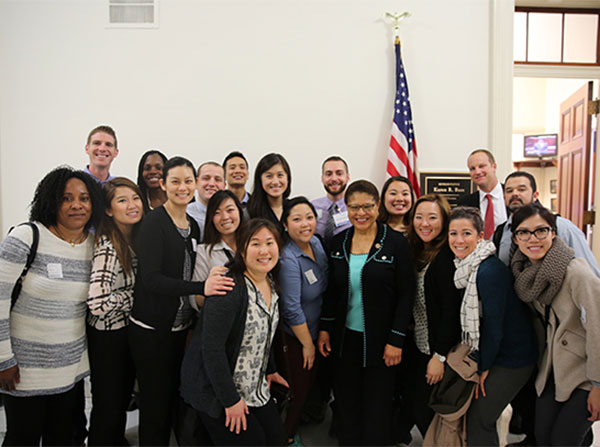
Students pose with Congresswoman Karen Bass, an alumni of the Primary Care Physician Assistant Program at the Keck School of Medicine of USC, in front of her office on Capitol Hill.
This year 18 students traveled to meet with their congressional representatives and the two California senators to talk with them about legislation that impacts primary care, student loans and diversity in the profession.
Last fall, Congresswoman Karen Bass, an alumna of the Primary Care PA Program, introduced the Physician Assistant Education Public Health Initiatives Act of 2015 and the Physician Assistant Higher Education Modernization Act of 2015 to Congress. These pieces of legislation work to help combat issues of medical shortage in primary care by providing more scholarship to disadvantaged PA students, authorizing loan repayment for PA students who serve in areas of national need, increasing loan limits for PA students, developing PA programs at historically black institutions, providing grant preference to Hispanic Serving Institutions, growing opportunities for PA faculty and enhancing educational technology for PA programs.
“It was so exciting to meet with Congresswoman Bass and collaborate,” said Sijin Park, a participating PA student. “It was an opportunity of a lifetime to be on Capitol Hill and represent the voices of future PA students.”
Students met with American Academy of Physician Assistant and Physician Assistant Education Association team members to learn about how to tell their own stories to representatives and staffers to advocate for co-sponsorship on these bills. They learned about how the activities in Washington, D.C. affect their practice and how they can put their best foot forward.
“I learned how to advocate – not only for my profession, but for my patients and myself and although the law-making process is lengthy and tedious, I continue to embrace the concept that one person can make an impact,” said Tracy Nguyen, a PA student on the trip.
On the final day, students met with staffers from the offices of Senators Dianne Feinstein and Barbara Boxer, and individually with representatives from their own congressional districts. During these encounters, students spoke about their experiences in the classroom, participating in Student-Run Clinic and the Pipeline Program. Students advocated for their representatives to act as co-sponsors of the two pieces of legislation in the House and for the Senators to lead in creating a matching bill for the Senate.
by Claire Norman